by Admin | Aug 20, 2013 | Highlights
This story from fashionunited.co.uk, reflects the negative criticism the American Alliance for Bangladesh Worker Safety is receiving as it begins to implement the plan to meet its September deadline.
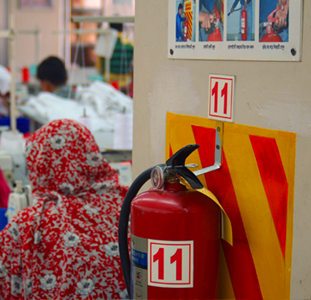
Credit-http://www.bangladeshworkersafety.org
Major US retailers including Gap and Walmart are expected to begin implementing the Bangladesh safety-plan, to meet the September 10 deadline. In the wake of the Bangladesh factory that collapsed last April, a group of 20 retailers will appoint an executive director and management firm to oversee the 45 million dollar funding in place to improve worker safety.
The retailers, which also include Macy’s and Target, struck a five-year deal to train workers and inspect factories. It will, however rely on factory owners in Bangladesh to pay for their own safety renovations despite the retailing committing to providing 100 million dollars in low-cost loans toward the effort. Participation in the lending program is voluntary and varies by retailer, according to the Wall Street Journal.
The agreement continues to attract scrutiny from labour activists and worker groups who say the safety plan falls short of a separate, legally binding agreement that commits Hennes & Mauritz, Tommy Hilfiger parent PVH Corp and 70 other, mostly European companies to directly pay for the costs of repairing and renovating some 5,000 Bangladesh garment factories.
Critics also complain of the absence of labor organizations from the North American alliance’s board of directors and say that nothing will change as long as the retailers continue to control the inspection process by choosing and paying the auditors, as well as electing a board that is supposed to conduct oversight and ensure the companies follow through with their safety plan.
“They are essentially asking the companies and factory owners to regulate themselves,” said Scott Nova, executive director at the Worker Rights Consortium, who helped craft the European-led accord. “They want people to see this as an alternative plan, but it’s no different than what companies have been doing without success for decades.”
The North American retail alliance’s eight-member board includes four company representatives from Target, Wal-Mart, Gap and VF Corp. as well as former US Ambassador to Bangladesh Jim Moriarty and fire-safety consultant Randy Tucker, both of whom were employed by the companies on previous safety programs.
by Admin | Aug 6, 2013 | Highlights
Garment worker woes, in Bangladesh, are not a recent development. In this report from the International Labor Rights Forum in 2010, the suffering and repression of factory labor in Bangladesh is made apparent. Their meager monthly wage of $43 not only far behind their demand for $72, but was also nutritionally less than prisoners in the country! Trade union leaders and human rights groups that challenged their unfair situation were subjugated. The recipe was ripe for disaster and it hit three years later.
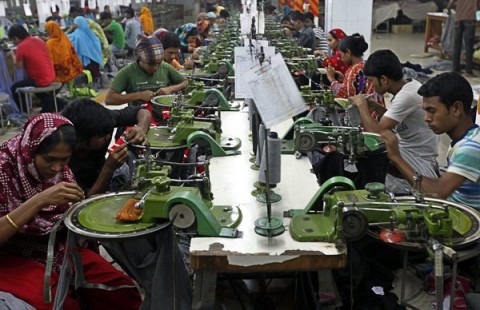
November 1, 2010 – A report by the International Labor Rights Forum (ILRF) released today reveals a severe government crackdown on labor rights activists in Bangladesh in the last few months as the country’s garment workers demanded higher wages. Bangladeshi garment workers are the worst paid workers in the world. Worker protest against low wages and poor working conditions peaked in early August this year following the government’s announcement of a new $43 monthly minimum wage, well short of workers’ needs and expectations. The new wage is scheduled to take effect today.
“We were forced to take to the streets as the owners exploited us right under the government’s nose,” said a garment worker quoted in The Daily Star, a Bangladeshi newspaper, after the government announcement of the new minimum wage.
According to the ILRF report, Enemies of the Nation or Human Rights Defenders? Fighting Poverty Wages in Bangladesh, the new $43 dollar minimum wage is still a “malnutrition wage.” Even Bangladeshi prisoners are better off than garment workers in nutritional terms, the report claims. It estimates a garment worker needs almost four times the new minimum wage just to feed her average-sized family.
The ILRF report criticizes the Bangladeshi government for scapegoating labor activists for inciting worker unrest and branding them “enemies of the nation” instead of dealing with workers’ genuine grievances. Focusing on the experiences of the leaders of the Bangladesh Center for Worker Solidarity, one of the most prominent labor rights groups in Bangladesh, the report relates a harrowing story of persecution as Bangladeshi police and security forces, including the notorious Rapid Action Battalion, raided staff members’ homes and attempted by subterfuge to discover the hideouts of the organization’s leaders. When captured, two of the labor leaders were tortured in custody to extract a confession that the organization had fomented worker riots.
Human rights groups, labor rights groups, and industry groups have denounced the Bangladeshi crackdown on labor rights activists. Human Rights Watch condemned the “serious harassment of trade union leaders and other labor rights activists and workers in the ready-made garment (RMG) industry who have been pressing for the right of workers to organize in unions and seeking increases in Bangladesh’s minimum wage regulations” in a letter to Prime Minister Sheikh Hasina on August 10, 2010.
The ILRF report calls on both companies and the Bangladeshi government to take action to protect civil liberties for the Bangladesh Center for Worker Solidarity and other labor rights defenders and increase the minimum wage for garment workers to at least $72 per month, the workers’ demand.
“We hope that this report will help bring justice for the leaders and staff of Bangladesh Center for Worker Solidarity and, in so doing, advance the cause of Bangladeshi garment workers who seek only the basic dignity of decent work and good wages,” said Bjorn Claeson, author of the report and director of the SweatFree Communities program at ILRF.
Enemies of the Nation or Human Rights Defenders? Fighting Poverty Wages in Bangladesh is available at www.sweatfree.org/bcws.
***
The International Labor Rights Forum (ILRF) is an advocacy organization based in Washington, DC, dedicated to achieving just and humane treatment for workers worldwide. ILRF serves a unique role among human rights organizations as advocates for and with working poor around the world. We believe that all workers have the right to a safe working environment where they are treated with dignity and respect, and where they can organize freely to defend and promote their rights and interests.
A program of the International Labor Rights Forum, SweatFree Communities, coordinates a national network of grassroots campaigns that promotes humane working conditions in apparel and other labor-intensive global industries. SweatFree campaigns build broad community support for sweatshop-free government purchasing and help build a market for decent working conditions.
by Admin | Jul 31, 2013 | News
In yet another testimony to how the garment industry in Bangladesh is evading reform, Emran Hossain, writing for the Huffington Post, states that the reforms made by the Bangladesh government targeted at the garment industry “barely improve safeguards for impoverished garment-sector workers, and in some cases they undermine existing ones.” Hossain’s article elucidates the greed of garment factory owners, the weak and corrupt government and lopsided approach to reform that may favor the industry more than its workers.
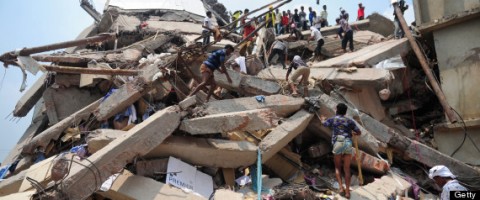
Credit- Getty Images/ AFP/ Munir UZ Zaman
In the wake of the Rana Plaza building collapse that claimed 1,129 lives, the Bangladeshi government announced earlier this month that it had made dozens of amendments to national labor law in an effort to better protect workers. While those changes have been hailed in the media as pro-worker and stronger than earlier law, in reality those amendments barely improve safeguards for impoverished garment-sector workers, and in some cases they undermine existing ones.
Legal experts and labor rights activists in Bangladesh explained to The Huffington Post how a number of the amendments will ultimately benefit business interests, rather than the employees they were intended to serve.
“The greed for profit has pushed Bangladesh’s garment industry into its present, disastrous condition,” said Salim Ahsan Khan, legal counselor at The Solidarity Center, a global labor rights group. “And it’s for the same greed that we miss this opportunity to strengthen laws needed for a growing garment industry.”
For starters, the amendments do nothing to ramp up the already-weak punishments for factory owners who put their workers in danger. The Rana Plaza factory owners and managers were given the highest charge possible under the law: contravention of law with dangerous results, or failing to warn workers ahead of an accident, resulting in a loss of life (though the owners forced workers to enter the building). The punishment for one of the most deadly tragedies in Bangladesh’s history? If convicted, those responsible would be sentenced to a mere four years in prison. The recent amendments leave such modest sentencing in place.
“Punishments are there in the law to deter violators. But, unfortunately, the amendments do not deal with their weakness,” said AKM Nasim, senior legal counselor at The Solidarity Center.
It is widely believed that disasters continue to plague the garment industry because factory owners have little to fear in the way of punishment. In the case of Rana Plaza, the tragedy likely never would have happened had the owners of the building and factories not pressured workers to clock in after dangerous cracks were discovered in the structure. Over the course of the past decade, few Bangladeshi business owners have been held to account in a spate of disasters that have claimed some 6,000 lives.
The recent amendments to labor law do incorporate new building and construction codes. But legal experts say that because these provisions don’t come with serious offenses for business owners who fail to comply with the new codes, there is little incentive for them to improve their buildings. Furthermore, influential businessmen in Bangladesh have a way of avoiding such violations to begin with; government inspectors are often resistant to cite them, due to their strong influence on the government.
Several of the amendments to labor law are supposed to make it easier for workers to unionize in a country where collective bargaining is weak. Unfortunately, much of the unionization process is now left to the discretionary power of certain bureaucrats. Under the new amendments, the registrar for trade unions can deny workers the permission to unionize if the official is unsatisfied with the petition. This provision has angered workers and labor rights activists alike, given the country’s infamous history of corruption. The registrar, they worry, may end up catering to powerful businessmen and denying workers their union elections.
“The law should have been that workers cannot be prevented from unionizing once some specific requirements are met,” Nasim said. “But in addition to meeting the requirements, the law requires you to satisfy the registrar.”
Like before, the workers will need to show support of 30 percent of their colleagues in order to apply for union registration. Labor rights activists had wanted that requirement reduced to 10 percent, due to the hurdles that come with organizing a massive factory. But that proposal was turned down.
Still, workers found small victories in the changes to unionization guidelines. Owners, for instance, will no longer be supplied by the government with a list of workers seeking to unionize — a procedure that in the past had led to suspensions, firings and crackdowns on organizing efforts. The amendments also partly fulfilled workers’ demands that employees from outside factories be allowed in particular unions. Now, 10 percent of the union members in government-owned factories may come from outside the factory, although private-sector factories are carved out of this stipulation. (Government factories are almost defunct in Bangladesh. For example, almost all garment factories — the primary industry in the country — are private.)
Despite these modest benefits for workers, unionization remains illegal in government-controlled export processing zones. Even after the most recent changes, no union is allowed inside any of the official processing zones, though many of the plants that produce clothes for Western countries are located in these areas.
And the government still reserves the right to stop any demonstration or strike deemed disruptive to the community or harmful to the national interest. The historical record indicates there is little chance for change here: Since the rise of Bangladesh’s garment industry in the late 1970s, every decent-sized demonstration has been declared disruptive. Even the 2006 labor unrest — which, after decades of industrial growth, led to the formulation of the country’s minimum wage — was identified by the government as an international conspiracy to destroy the country’s garment industry.
Furthermore, the labor law amendments appear to have made it easier to dismiss workers. According to the amendments, owners can dismiss workers accused of “misconduct” without giving them severance benefits. Earlier, such a dismissal required payment. Labor rights activists fear this will now be abused by the owners, who will use the provision to target union activists.
“It will not be possible for the union leaders to work for the workers freely, since they’ll work in fear of losing their jobs,” Nasim said.
The amendments also exempt export-oriented factories from having to share 5 percent of their profits with workers, as they were previously required to do, at least in theory. Of course, Bangladesh’s primary export-oriented sector is the garment industry. Labor rights activists claim this amendment will benefit several thousand factory owners at the expense of about four million workers.
“The labor law is amended only to meet owners’ expectations,” said Nazma Akter, president of the Sammilito Garment Shramik Federation, a trade union association.
Kalpona Akter, executive director of the Bangladesh Center for Worker Solidarity, says that another provision in the amendments sanctions the practice of outsourcing. While contracting out factory work had been loosely permitted before, now contractors who supply workers to factories will register with the government. According to Akter, the new law is a de facto encouragement of the practice.
Nasim, the lawyer, said more outsourcing will allow factory owners to dodge the responsibilities they have as workers’ direct employers. The responsibility will now instead fall to the contracted labor supplier.
Nazma and Kalpona have good reason to believe the industry will benefit more from the new amendments, rather than workers. More than a third of the lawmakers who approved the legal changes are businessmen, most of them in the garment sector. Nearly half of those lawmakers are from the ruling coalition government, and many of them were involved in bringing the amendments to pass.
A number of the most recent measures are almost comically meaningless — such as those changing the use of the word “latrine” in the earlier law. Other amendments dealt with clarifying language in previous legislation, and even corrected punctuation marks.
When contacted by HuffPost, Atiqul Islam, the president of the Bangladesh Garment Manufacturers and Exporters Association, insisted that the new amendments are strong, though he said they would be a challenge for businesses to comply with.
“However, I welcome this law for the sake of our garment industry,” he said.
When asked about the shortcomings in the amendments that have been detailed by labor activists and others, Islam said he hadn’t noticed them, then cut the interview short.
“I have to take a look at it again,” he said. “I need to leave this conversation now. I am in the middle of my prayer.”
by Admin | Jul 31, 2013 | Highlights
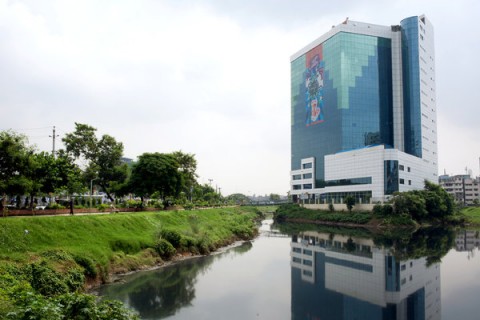
Credit- New York Times/ Taslima Akhtar
While developed countries debate regulations and trade impositions after the Rana Plaza collapse, Bangladesh needs to independently bolster reforms surrounding the garment industry. At present, the garment industry enjoys special privileges like subsidies and tax breaks and, they pay less tax as compared to other industries. Their factories, too, are not all build on legally obtained land, sometimes with environmentally detrimental consequences. The following New York Times article, reported by Jim Yardley, has the complete story.
Garment Trade Yields Power in Bangladesh
DHAKA, Bangladesh — In the honking, congested heart of this overcrowded capital, one glass office tower stands uniquely alone, surrounded by water, accessible by a small bridge. It is a symbol of the power of Bangladesh’s garment industry, the headquarters of the country’s most powerful association of factory owners. It is also illegal.
So said the Bangladesh High Court, concluding that the land had been illegally obtained, the building had been erected without proper approvals and the location threatened a network of lakes that form the natural drainage system of the capital. The High Court called the building “a scam of abysmal proportions” and ordered it demolished within 90 days.
That was two years ago. The building still stands. The case is now in a legal limbo — more proof, according to critics, of the power of the Bangladesh Garment Manufacturers and Exporters Association. Members control the engine of the national economy — garment exports to the United States and Europe. Many serve in Parliament or own television stations and newspapers.
For two decades, as Bangladesh became a garment power, now trailing only China in global clothing exports, the trade group has often seemed more like a government ministry. Known as B.G.M.E.A., the organization helps regulate and administer exports and its leaders sit on high-level government committees on labor and security issues. Industry trade groups in the United States could only imagine such a role.
But the April collapse of the illegally constructed Rana Plaza factory building, which killed more than 1,100 people, has placed the entire global supply chain that delivers clothes from Bangladeshi factories to Western consumers under scrutiny. And the quasi-official garment group, in the eyes of its critics, presents a major conflict of interest at the center of Bangladesh’s troubles and is a big part of the systemic problems that have made the country a dangerous place for garment workers.
“You can’t put the fox in charge of the chickens,” said Rizwana Hasan, an environmental lawyer. “B.G.M.E.A. has no regulatory authority under the laws of the country. It’s a clubhouse of the garment industry.”
Bangladesh is working to restore the garment industry’s credibility after last month’s decision by the Obama administration to suspend a special trade preference for the country. The European Union is also considering penalties. Bangladesh has responded by passing new labor laws and pledging to inspect the structural safety and legal compliance of the nation’s 5,000 garment factories.
In both instances, the garment group’s interests were well represented. It has hired a team of engineers and is helping oversee the post-Rana Plaza factory inspections — even as the High Court cited the group for a litany of violations on its own headquarters. Meanwhile, the trade group brought its influence to bear in a lobbying campaign as Parliament amended the labor laws this month.
Bangladeshi officials promised to overhaul their labor laws, which fall short of standards defined by the International Labor Organization and tend to suppress unions, contributing to safety problems, labor advocates say. But the results of the overhaul were less significant, especially for the garment industry. One amendment required that industries create profit-sharing programs for workers. But exporting industries, notably the garment sector, were exempted.
Restrictions on labor organizing were eased, but far from fully lifted. The new law requires that 30 percent of factory workers must sign petitions to form a union, a telling obstacle given that many factories have thousands of employees and have few places to hold meetings and organize.
“Bangladesh had a golden opportunity,” said Roy Ramesh Chandra, a labor leader, who said that the political influence of factory owners diluted some of the amendments. “The employers have tremendous influence.”
Business interests dominate Bangladesh’s Parliament. Of its 300 members, an estimated 60 percent are involved in industry or business. Analysts say 31 members, or 10 percent of the country’s national legislators, directly own garment factories, while others have indirect financial interests in the industry.
Factory owners say their political clout is vastly overstated and dismiss suggestions that they exert influence over top elected leaders, and some analysts agree their influence is sometimes overstated. But the trade group clearly is part of the process in ways that set Bangladesh apart.
Three years ago, the prime minister created an industrial police force to maintain order in factory districts and act as an independent arbiter to solve disputes between workers and management. But many workers and labor organizers say the force almost always favors owners. The trade group is even supposed to buy patrol cars for officers.
“This organization is extremely powerful,” said one senior government official, who said much of its clout comes from political contributions. “The political parties are running after money.”
The trade group was formed in 1983 as Bangladesh, then one of the world’s poorest countries, was trying to build its economy by developing a garment industry. Initially, it had no headquarters and no bank account.
“When I first went out there, the B.G.M.E.A. was run out of a garage,” said Don Brasher, who worked as a trade consultant to Bangladesh for more than a decade. “It was not institutionalized at all.”
That quickly changed. Under the rules of global textiles, developing countries faced restrictions on garment exports and, in the case of the United States, were assigned trade quotas. Managing this quota system was critical and complicated. Bangladesh’s government decided to delegate administrative tasks to the trade group — including the authority to regulate certain transactions and collect fees.
“That was pretty extraordinary,” said Mr. Brasher, who lived in Dhaka for two years and worked closely with the group on the quota system. “Ordinarily, that is done by a government agency. There’s nothing like that, anywhere. But it was done out of necessity.”
Bangladesh’s government is notoriously corrupt and has limited bureaucratic capacity to handle the intricate mechanics of global trade. Politics is ferociously contested and marred by regular nationwide strikes, known as hartals. In this environment, the group became a stabilizing force as global trade rapidly grew.
Even after the quota system expired in 2005, the trade group steadily expanded its regulatory responsibilities. Today, it enjoys a near stranglehold on exports: only factories that are among its members are allowed to export woven garments, with some exceptions. The group regulates the importation of fabric and issues certificates of origin, the required proof that a garment is made in Bangladesh. It has arbitration committees to settle disputes and administers the often-complex practice of subcontracting.
On a recent evening, Atiqul Islam, the group’s president, sat at his desk and signed applications from factory owners seeking duty-free status to import machinery. A half-hour earlier, he had presided over a news conference about a skills training program for workers that the group had organized with the United Nations Development Program, the British international development agency UK-AID and the International Labor Organization.
“Zero power,” he said while signing the tax waiver applications, flicking away a question about the group’s influence. “The government decentralized a few things to us, so we are doing them. We can do it much faster.”
Many factory owners portray the industry as a public service, providing millions of jobs. The health of the garment sector is often seen as a national security issue, with the industry accounting for 80 percent of Bangladesh’s manufacturing exports and providing critical foreign exchange. It is the trade group that maintains order in daily operations of the industry, owners say.
“Otherwise, there would be chaos,” said Annisul Huq, a former president of the trade group. “Yes, we can criticize the B.G.M.E.A. But it has a very strong role. Somebody has to lead.”
Factory owners face many challenges in Bangladesh, including high interest rates on loans. But the heroic self-image of the sector is somewhat overstated. Garment factories enjoy subsidies and tax breaks not offered to other industries, and pay less tax. A recent study in a Bengali-language newspaper estimated that these subsidies and tax breaks exceeded tax revenues from the industry by roughly $17 million.
“The doors of the treasury are open for them,” said Badiul Alam Majumdar, secretary of the nonprofit group Citizens for Good Governance. “They extract all kinds of subsidies. They influence legislation. They influence the minimum wage. And because they are powerful, they can do, or undo, almost anything, with impunity.”
One unlikely critic of the trade group is Rubana Huq, the wife of Mr. Huq, who is now the managing director of the family’s garment conglomerate, Mohammadi Group. She said the garment industry in Bangladesh has matured and must be regulated by a transparent, independent arbiter, possibly a new government ministry.
“Of course, there is a conflict of interest,” she said. “There is no reason why a body like B.G.M.E.A. would be credible with the international players.”
Ms. Huq and other critics point to the headquarters building as a symbol of its protected status. Environmentalists have long protested and argued that the building’s location on a de facto island inside a city lake impedes the natural drainage network and contributes to flooding in the capital during the monsoon.
Illegalities abounded, according to the High Court ruling: construction started before the group had won final approval on a building plan; the land transfer from a government agency violated national laws on usage of public land. Yet the group’s leaders argue that the building’s status has been validated at the highest level: two prime ministers led different inauguration ceremonies at the site.
“It is not illegal,” said Mr. Huq, his voice rising. “We have applied to the government for the land. The government has given us the land. Two prime ministers have opened it. What validation do you want?”
But Iqbal Habib, an architect who designed the plan to renew the lake system, said the group could not be exempted from rules governing others. “They are always talking about their compliance with the buyers,” he said. “What about their compliance with the laws of the country?”
For now, the case is stalled. The Supreme Court is supposed to hold a final hearing, but with elections coming, the government has shown little interest in confronting the country’s most powerful industrial bloc. It is unclear if a hearing will take place.
“It has gone to the Supreme Court,” Mr. Huq said. “That could take forever. It is Bangladesh. We have full trust — as long as they give a verdict in our favor.”
He is smiling, joking, to a degree.
Julfikar Ali Manik contributed reporting.
by Admin | Jul 23, 2013 | Highlights
Time Magazine’s online news portal reports on a significant reduction in the number of people living in poverty in Bangladesh. According to the article, The World Bank announced that number of people living in poverty dropped from 63 million in 2000 to 47 million in 2010. The proportion of the population living below the poverty threshold — also known as ‘poverty rate’- was reduced to 26 percent from 29.5 percent.
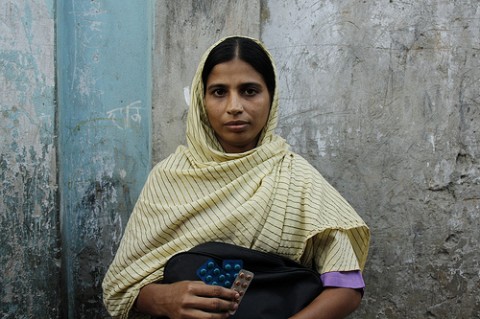
Source- Flickr Creative Commons/ DFID UK
These under-reported figures deserve a noteworthy mention for a country that is plagued by poverty, natural calamities and infrastructural breakdown.
Click here to read the complete article.




